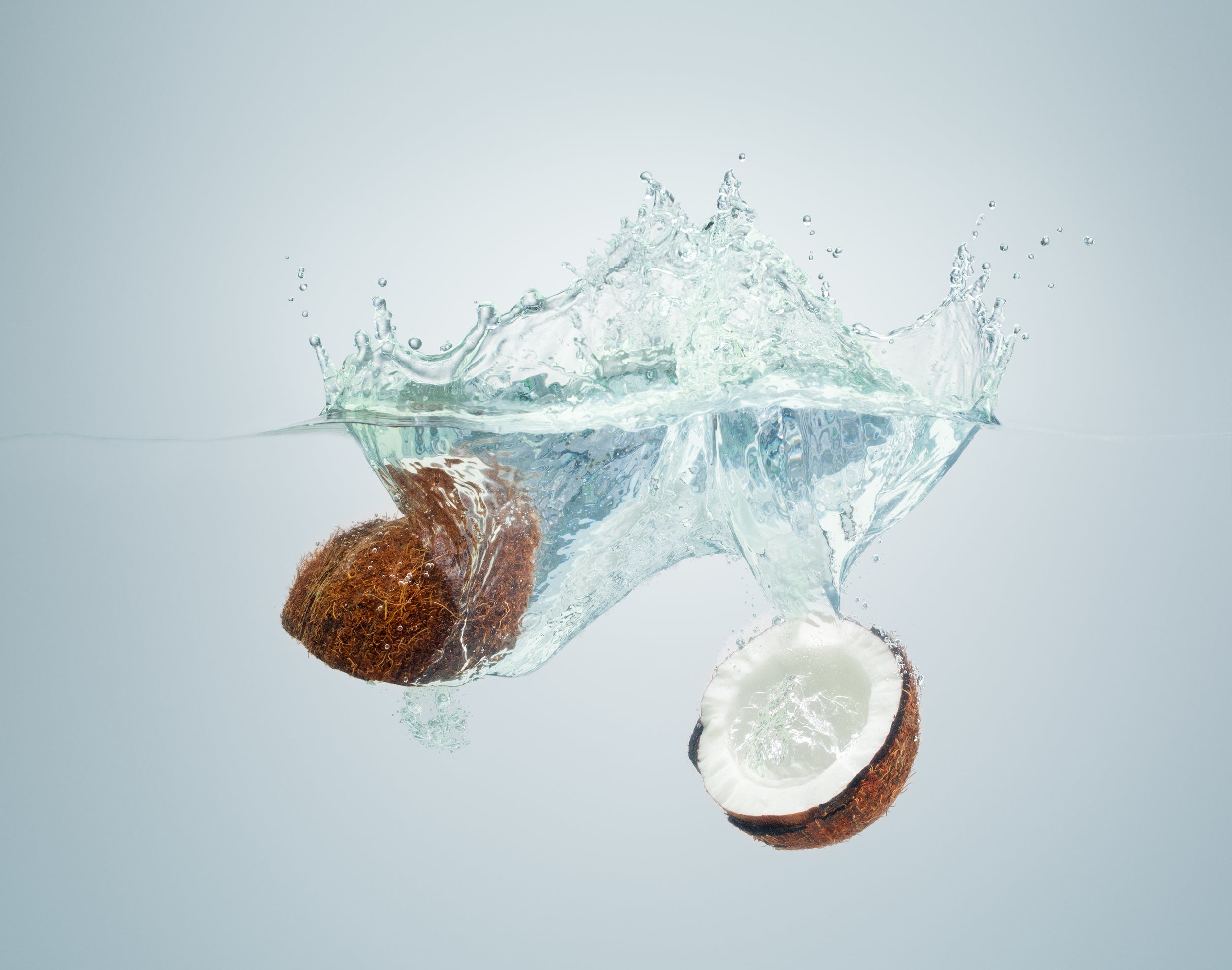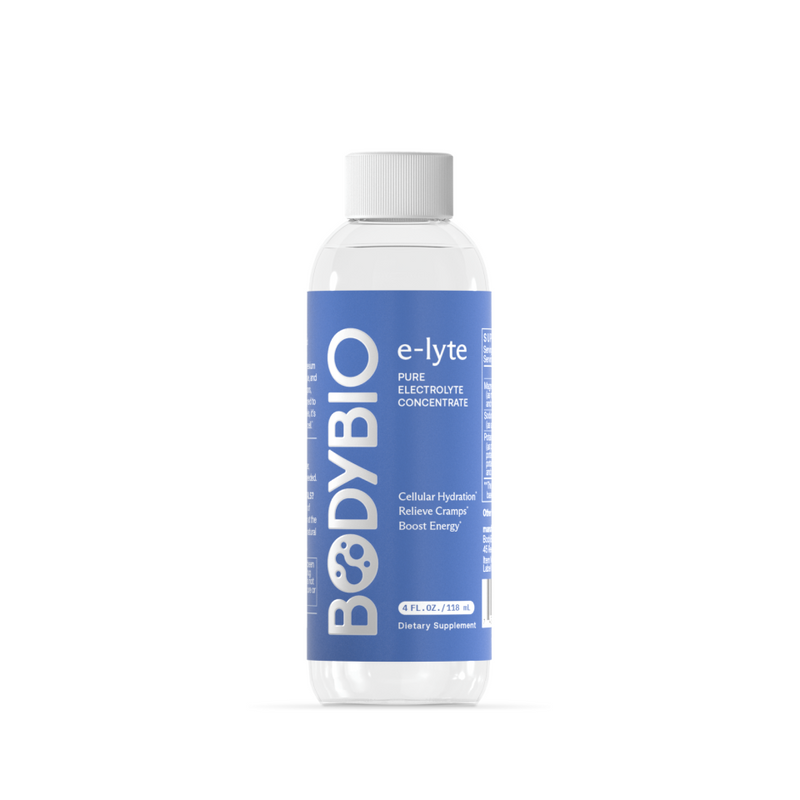Coconut Water: Is It Good For You and Can It Help With Hydration?
Authors:

Dr. Thomas Wnorowski
PhD, CNCC Research Director, BodyBio & Biomedical NutritionistWhether or not Robinson Crusoe was sustained by it, coconut water has gathered a following among fitness fans looking for an all-natural alternative to sports drinks, but it may not be good enough for all athletes. However, science has found evidence to support the role of coconut water in health and medicinal applications. One of the traditional uses of coconut water is as a growth supplement in plant tissue propagation and culture, but a wider application can be justified by its unique chemical composition of sugars, vitamins, minerals, amino acids, and phytohormones.
Coconut Water Nutrition Facts
Why does a coconut contain water and what is coconut milk? Great questions! Turns out that “WATER absorbed by the root system flows against gravity through the capillaries to the nut. Freshwater that gets accumulated in coconut is actually 'endosperm' or the food or nourishment for the coconut's growth (1)”. This water is served directly to quench thirst. Coconut milk, on the other hand, is the product obtained by grating the solid endosperm with or without additional water to use in recipes, baking, etc.
Coconut water is more than 90% water, the milk about 50% water, but also containing fat and protein (Seow, 1997). Coconut water is a clear isotonic (meaning that the tonicity, or tension of a solution is similar to that of a body fluid and exerts basically the same pressure on both sides of a membrane).solution plentiful in young coconuts. As the coconut matures, its chemical composition and liquid volume change. The liquid may exceed half a liter at nine month’s maturity (Jackson, 2004).
Coconut Water + Anti Aging
One lesser-known benefit of coconut water may be in its anti-aging properties. While the vitamin content of coconut water is low, its phytonutrients (Chemicals produced by plants with antioxidant and anti-inflammatory benefits), cytokinin (a class of plant growth substances that promote cell division), and its analog kinetin (a type of cytokinin), have demonstrated appreciable impact as anti-aging agents.
Isolated more than half a century ago, cytokinin has a potent biological effect on plant cells and tissues that influence gene expression, cell cycle, chloroplast development, biosynthesis stimulation of vascular architecture, and delay of aging. In fact, in a randomized, double-blind, controlled study, a combination of topical cosmetic ingredients that featured kinetin and niacinamide was found to induce a reduction in spots, pores, and wrinkles and to re-establish evenness after eight weeks (Chiu, 2007). Additionally, age-related changes attributed to lipofuscin, an indicator of damage represented as brown pigmentations from oxidized fats, were delayed (Rattan, 1994).
Is Coconut Water The Best Electrolyte Replacement Options?
Is coconut water the best way to stay hydrated? There are mixed opinions. Though not quite as balanced as some electrolyte replacement beverages, and lacking in sodium, coconut water is not the worst option for hydration. To overcome coconut water’s sodium shortfall, some formulators add salt and other enhancements to their drink and then market it as a complete sports beverage. This type of adulteration is common and can ramp up calories and added sugars without really giving you true hydration benefits.
The absorption of coconut water is far superior to that of soft drinks, though, which are often used as fluid replacements by those who are unaware of other options (Chavalittamrong, 1982). The problem with this application, however, is the variability of sodium and glucose content of the coconut fluid at various stages in its development (Fagundes, 1993). A legitimate coconut water purveyor will have analyzed his product before packaging and will put that data on the label.
Another thing to consider is cost. Coconut water costs about fifteen cents an ounce. A quality electrolyte replacement concentrate, making four gallons of sports beverage, costs about four cents an ounce, and has the right balance of potassium and sodium, the two important players in muscle contraction and relaxation.
Finally, in terms of nutrients, coconut water is touted as being high in potassium — one of the electrolytes essential to muscle function as the body’s predominant intracellular cation. One cup of coconut water (240 gm) carries about 600 mg of potassium, which is a fraction of the Institute of Medicine’s recommended 4700 mg. The concern is that potassium needs to be balanced with sodium, the electrolyte first lost to heavy sweating. This is where coconut water falls short as a sports beverage. The sodium content of one cup of coconut water is about 250 mg, not enough to aid recovery after a hard workout that spent eighteen times that by sweating more than a day’s worth of suggested intake. In comparison, there’s more sodium in a glass of vegetable juice.
The Optimal Way to Hydrate
If coconut water isn’t the best way to hydrate and get the electrolytes your body needs to function optimally, what is? First, it’s important to remember that electrolyte loss can be a result of stress, exercise, poor diet, pregnancy, illness, or medications. This means that every one of us can probably use the extra support. To support all bodies in an affordable way we’ve crafted a product with the three ingredients you need to bring your electrolytes back into the ideal pH balance; sodium, potassium, and magnesium. We add zero sugar or artificial sweeteners, just pure salty electrolytes. Learn more and try BodyBio E-Lyte here.Adams W, Bratt DE. Young coconut water for home rehydration in children with mild gastroenteritis. Trop Geogr Med. 1992 Jan;44(1-2):149-53.
Adolf K Awua, Edna D Doe and Rebecca Agyare Exploring the influence of sterilisation and storage on some physicochemical properties of coconut (Cocos nucifera L.) water BMC Research Notes 2011, 4:451
Casati S, Ottria R, Baldoli E, Lopez E, Maier JA, Ciuffreda P. Effects of cytokinins, cytokinin ribosides and their analogs on the viability of normal and neoplastic human cells. Anticancer Res. 2011 Oct;31(10):3401-6.
Chavalittamrong B, Pidatcha P, Thavisri U. Electrolytes, sugar, calories, osmolarity and pH of beverages and coconut water. Southeast Asian J Trop Med Public Health. 1982 Sep;13(3):427-31.
Chee C. Seow, Choon N. Gwee Coconut milk: chemistry and technology International Journal of Food Science & Technology. May 1997; 32(3): 189-201
Chiu PC, Chan CC, Lin HM, Chiu HC. The clinical anti-aging effects of topical kinetin and niacinamide in Asians: a randomized, double-blind, placebo-controlled, split-face comparative trial. J Cosmet Dermatol. 2007 Dec;6(4):243-9.
DebMandal M, Mandal S. Coconut (Cocos nucifera L.: Arecaceae): in health promotion and disease prevention. Asian Pac J Trop Med. 2011 Mar;4(3):241-7. Epub 2011 Apr 12.
Dudzik P, Dulińska-Litewka J, Wyszko E, Jędrychowska P, Opałka M, Barciszewski J, Laidler P Effects of kinetin riboside on proliferation and proapoptotic activities in human normal and cancer cell lines. J Cell Biochem. 2011 Aug;112(8):2115-24.
Fagundes Neto U, Franco L, Tabacow K, Machado NL. Negative findings for use of coconut water as an oral rehydration solution in childhood diarrhea. J Am Coll Nutr. 1993 Apr;12(2):190-3.
Institute of Medicine of the National Academies Dietary Reference Intakes: Water, Potassium, Sodium, Chloride, and Sulfate Released:February 11, 2004
Jose C. Jackson, Andre Gordon, Gavin Wizzard, Kayanne McCook and Rosa Rolle Changes in chemical composition of coconut (Cocos nucifera) water during maturation of the fruit Journal of the Science of Food and Agriculture. Jul 2004; 84(9): 1049-1052
Kende H, Zeevaart J. The Five "Classical" Plant Hormones. Plant Cell. 1997 Jul;9(7):1197-1210.
Mik V, Szüčová L, Smehilová M, Zatloukal M, Doležal K, Nisler J, Grúz J, Galuszka P, Strnad M, Spíchal L. N9-substituted derivatives of kinetin: effective anti-senescence agents. Phytochemistry. 2011 Jun;72(8):821-31. Epub 2011 Feb 25.
Eze K. Nwangwa and Chukwuemeka P. Aloamaka Regenerative Effects of Coconut Water and Coconut Milk on the Pancreatic β–Cells and Cyto Architecture in Alloxan Induced Diabetic Wistar Albino Rats American Journal of Tropical Medicine & Public Health. 2011; 1(3): 137-146
Preetha PP, Devi VG, Rajamohan T. Hypoglycemic and antioxidant potential of coconut water in experimental diabetes. Food Funct. 2012 Jul;3(7):753-7. Epub 2012 Jun 27.
Rattan SI, Clark BF. Kinetin delays the onset of ageing characteristics in human fibroblasts. Biochem Biophys Res Commun. 1994 Jun 15;201(2):665-72.
Sandhya VG, Rajamohan T. Beneficial effects of coconut water feeding on lipid metabolism in cholesterol-fed rats. J Med Food. 2006 Fall;9(3):400-7.
Vermeulen K, Strnad M, Krystof V, Havlícek L, Van der Aa A, Lenjou M, Nijs G, Rodrigus I, Stockman B, van Onckelen H, Van Bockstaele DR, Berneman ZN. Antiproliferative effect of plant cytokinin analogues with an inhibitory activity on cyclin-dependent kinases. Leukemia. 2002 Mar;16(3):299-305.
A. Geo Vigila and X. Baskaran Immunomodulatory Effect of Coconut Protein on Cyclophosphamide Induced Immune Suppressed Swiss Albino Mice Ethnobotanical Leaflets 12: 1206-12. 2008.
Vigliar R, Sdepanian VL, Fagundes-Neto U. Biochemical profile of coconut water from coconut palms planted in an inland region. J Pediatr (Rio J). 2006 Jul-Aug;82(4):308-12.
Voller J, Zatloukal M, Lenobel R, Dolezal K, Béres T, Krystof V, Spíchal L, Niemann P, Dzubák P, Hajdúch M, Strnad M. Anticancer activity of natural cytokinins: a structure-activity relationship study. Phytochemistry. 2010 Aug;71(11-12):1350-9. Epub 2010 Jun 1.
tJean W. H. Yong, Liya Ge, Yan Fei Ng and Swee Ngin Tan The Chemical Composition and Biological Properties of Coconut (Cocos nucifera L.) Water Molecules. 2009, 14, 5144-5164

